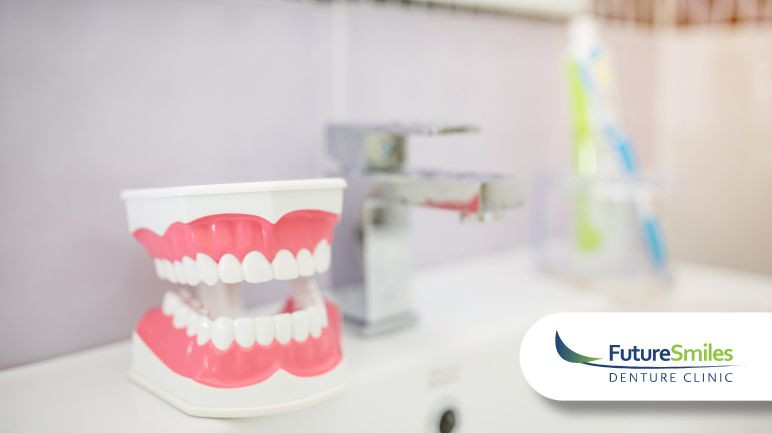4 Ways To Protect Your Denture Implants
- Regular Cleaning
Although denture implants aren’t susceptible to cavities the way natural teeth are, your gums are still at risk of developing disease and your oral health still impacts your overall health. Brushing your teeth twice a day and rinsing your mouth with mouthwash will help to rid your mouth of bacteria. Instead of flossing your teeth, use a water pick or small, soft brushes to clean near where your dentures meet your gum line. Be careful and gentle when cleaning the gum line, as you don’t want to damage where the gum connects to the implant. Keeping your mouth healthy with regular cleaning will help you to keep your gums safe from periodontal diseases such as gingivitis and peri-implantitis, and it will help prevent bad breath. - Non-Abrasive Materials
Since denture teeth are made of a slightly softer material than natural teeth, they need slightly different treatment. Make sure you brush your denture teeth with a soft-bristled brush and non-abrasive toothpaste to keep your beautiful denture implants looking great. Also avoid whitening toothpaste and other whitening products, as they will alter the colour of your dental implants very little and will instead potentially damage the denture teeth. - Dental Exams
If you have no natural remaining teeth, you might think you’ll never have to go to the dentist again, but this is actually still necessary. Visiting the dentist every 6 months will help you keep your mouth clean and your gums safe with professional teeth cleanings. Dental exams are also vital for oral health. Visiting the dentist twice a year when you have dentures lets your dentist check to see if you are developing any oral health issues, ranging from gingivitis to oral cancer. - No Smoking
Smoking tobacco is very damaging to oral health; it increases gum inflammation, weakens the gums around your denture implant, and increases your risk of developing oral cancer. Using tobacco, whether in the form of cigarettes, cigars, pipes, chewing tobacco, or any other form of tobacco consumption, will negatively impact gum health. Nicotine also damages gum health by limiting the blood supply to the gums. Even tobacco-free products such as e-cigarettes negatively impact gum health and should not be used by people with denture implants.
Speak To A Calgary Denturist About Denture Implants
If you are searching for a permanent denture solution, speak to a denturist about denture implants. Future Smiles is a Calgary-owned and operated denture clinic that strives to provide patients with comfortable, functional, and aesthetically pleasing denture solutions. If you have any questions about denture implants, you can visit our SW Calgary Denture clinic on Macleod, or our NE Calgary location in Coral Springs. To book a free consultation, you can call Future Smiles at 1-403-475-0016 or fill out the online contact form. If you are looking for a top-quality Calgary denturist to help you achieve a comfortable and natural-looking smile, contact Future Smiles Denture clinic.
FAQ
Q: What are the benefits of denture implants?
A: Denture implants
- Look and feel natural
- Do not cause sore spots like other traditional dentures
- Improve oral health and jaw bone structure
- Improve chewing ability
- Do not move in the mouth
Q: How long will dental implants take?
A: It will take 2 surgeries and a minimum of 5 months, as you will need time to heal from both surgeries.
Learn more by reading A Step By Step Guide To The Denture Implant Process.
Q: I need dentures. Where do I start?
A: The best place to start when considering replacement teeth is visiting a qualified denturist. During a free consultation, our denturist will be able to advise if dentures are the right treatment solution for you and which denture type works best for your specific needs.




.jpg)
.jpg)

